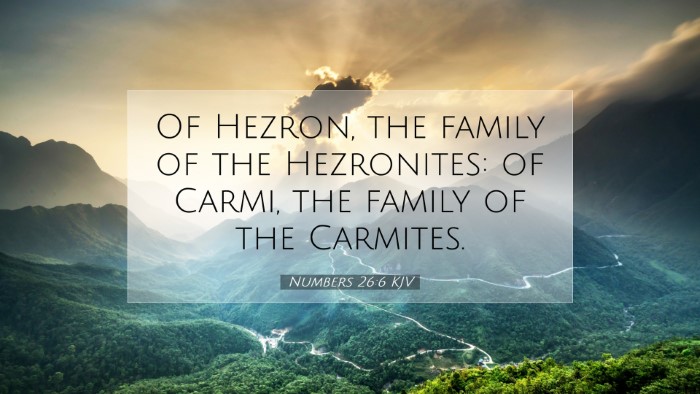Bible Commentary on Numbers 26:6
Bible Verse: Numbers 26:6 - “Of the children of Judah, the whole number of the males from twenty years old and upward, was threescore and sixteen thousand and five hundred.”
Overview
This verse is part of the second census conducted by Moses in the wilderness, designed to assess the military capability of the Israelites as they prepared to enter the Promised Land. The census follows the severe judgment inflicted on the previous generation that failed to enter the land due to unbelief and disobedience. By counting the males aged twenty and older, Moses highlights the readiness of the new generation to respond to God’s call.
Significance of the Census
The census serves multiple purposes, meticulously outlined by scholars:
- Preparation for the Promised Land: This numbering positions the Israelites to engage in future battles and conflicts as they claim Canaan.
- Demonstration of God’s Faithfulness: It illustrates how God is revitalizing His people after the decay of the last generation.
- Accountability: Each tribe's count highlights both individual and collective responsibilities to uphold God’s covenant.
Commentary Insights
Matthew Henry's Commentary
According to Matthew Henry, this verse reflects God’s providence and faithfulness toward His people. Each number not only indicates military strength but also serves as a reminder of God's promises. Henry emphasizes that despite previous failures, God is ready to fulfill His promises; the increase in numbers signifies His blessing upon the tribes of Israel.
Albert Barnes' Notes
Albert Barnes illustrates the importance of the tribe of Judah, noting its preeminence among the tribes of Israel. Judah's sizeable population forms a central part of Israel's army and leadership. Barnes points out that this census not only captures the physical strength of the tribe but also implies the spiritual continuing relationship between Israel and God. Furthermore, he connects the historical significance of Judah, as it would eventually become the lineage of David and, ultimately, the Messiah.
Adam Clarke's Commentary
Adam Clarke provides an analytical look at the numerical data presented in this verse. He highlights that the figure of 76,500 in Judah's census prominently illustrates the growth of the tribe since their departure from Egypt. Clarke notes the importance of this census in establishing the organizational structure of the Israelite community, indicating that counting the men who were twenty years and older was critical for preparing them for military duties. He underscores the spiritual acknowledgment of God's hand in increasing the numbers of those who would serve Him in strength and unity.
Theological Implications
The verse offers profound theological insights that warrant reflection:
- Divine Order: The structured census represents God's desire for order among His people, reminding them that they are a chosen nation with responsibilities.
- God's Sovereignty: The increase in numbers after years of wandering underscores God's sovereignty over Israel’s growth amidst adversity.
- Preparation for Conflict: The readiness indicated by this census connects with the broader theme of spiritual warfare found throughout Scripture, encouraging believers to be prepared in their faith.
Lessons for Today
This verse and its context offer vital lessons for contemporary believers:
- Faithfulness in Trials: Just as the Israelites were called to remain steadfast during their wandering, modern believers are reminded to trust in God during challenging seasons.
- Covenant Community: Unity within the body of Christ mirrors the community-like nature of the tribes, emphasizing the need for fellowship and collective responsibility in faith.
- Preparation for God’s Work: This passage encourages believers to equip themselves for service, whether through study, prayer, or outreach, echoing the call for readiness found in Ephesians 6:10-20.
Conclusion
Numbers 26:6 provides a snapshot of Israel’s readiness to inherit the Promised Land under God's guidance, exemplified through the tribe of Judah. The combined insights from public domain commentaries deepen understanding, emphasizing themes of divine faithfulness, preparation for ministry, and the significant role of community in fulfilling God’s plans. As pastors, students, theologians, and scholars reflect on this verse, they are encouraged to seek a deeper connection with God's purposes in their own lives and communities.


